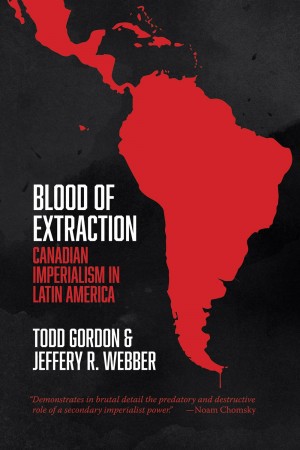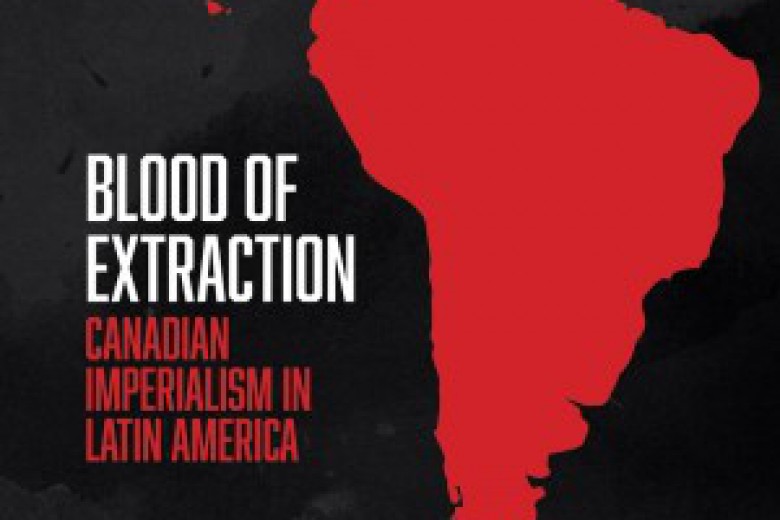
Accumulation by Dispossession, Expanded Reproduction, and Class Transformations in Latin America
Of the plethora of literature written in recent years on the contemporary dynamics of imperialism and the world capitalist system, Todd Gordon and Jeff Webber’s Blood of Extraction stands out as a particularly thought-provoking and empirically rich contribution. In contrast to both mainstream liberal commentators who consider Canada a peaceful ally to Global South countries, and political economy analysts who once dubbed Canada the world’s richest dependency, the authors seek to demonstrate Canada’s role as a major imperial force on the world stage. Contemporary imperialism is theorized as a series of political interventions by this imperialist state in the form of often militarized neoliberal policies designed to pave the way for Canadian capital’s entrance into Latin American countries, with the outcome of reinforcing uneven capitalist development between the countries of the North and those of the South. The particular dynamics of Canadian imperialism relate to the extraordinary expansion of Canadian mining corporations in Latin America, a process characterized as “accumulation by dispossession,” which has brought both ecological devastation and the dispossession of lands and resources from rural communities. The authors describe in impressive detail how the Canadian state has modelled itself as an active imperial agent operating in Latin America, aggressively facilitating the entrance of its mining corporations into territories through an array of strategies seeking to liberalize markets, prevent “resource nationalism,” protect foreign investments, reconstitute property regulations, weaken environmental protections, and contain or actively repress social opposition.
For the purpose of this symposium, I would like to draw attention to some of the most significant contributions of the book to the current debate, and invite the authors to provide greater clarification on the implications of their analyses and observations. The first contribution is the authors’ application of David Harvey’s concept of “accumulation by dispossession” to the contemporary dynamics of extractivism in Latin America. “Accumulation by dispossession” refers to the increased adoption of extra-economic strategies for accumulation, including fraud, coercion, and predation, as an ongoing feature of capitalist expansion in these territories – as distinct from the “normal” process of capital accumulation. In particular, this is associated with what the authors call “militarized neoliberalism,” a dynamic that adopts varying characteristics in different countries, with key examples that include Alvaro Uribe’s “democratic security” policy in Colombia and the “war on drugs” in Mexico, Central America, and Colombia. The key strength of this analysis is to demonstrate how the expansion of global capital into Latin America requires a parallel expansion of state and military power to open up territories to extractive capital, dispossess communities from their lands, and contain social protest. The authors’ focus on the political and military mechanisms through which Canadian capital creates the conditions for its expansion, including the incredible number of ways Canadian corporations, often with the help of the state, are appropriating communal lands and resources under the logic of global capital, is a commendable development for contemporary understandings of Marx’s notion of “primitive accumulation.”
Yet, granting that the contemporary dynamics of Canadian mining in Latin America are distinctly “predatory,” the implications of this notion require further clarification. The complexities of the processes involved are frequently bypassed, with problematic consequences for the application of the theoretical framework to the case studies.
While the authors lay out the notion of “accumulation by dispossession” in their theoretical introduction, the remainder of their historical and empirical analyses in the book present an array of processes that make no clear differentiation between “accumulation by dispossession” and “normal” processes of capitalist development.
Some examples include the relocation of production in the maquiladora and tourist sectors in Central America, which represent normal practices of capitalist cost cutting, or the growth of agribusiness displacing small and medium farmers, which is again a normal feature of capitalist competition. That is not to deny the brutality of these processes or the mechanisms of violence that are frequently invoked, but rather to state that these are very different dynamics than, for example, the dispossession of peasant and Indigenous communities from communal land or even the privatization of state industries.
A further issue is that, in many of the cases of dispossession of communities, it would seem that capitalist social relations are already in place. The ways in which the notion of accumulation by dispossession applies to the empirical and historical analyses of the case studies could be clarified with a more systematic treatment of the theoretical concepts of the book.
Another glaring point in the case studies is that the use of violence, predation, and fraud is by no means restricted to the contemporary phase of extractivism in Latin America, but rather would appear to be the modus operandi for capitalist development throughout the history of the region. As the authors point out, much of the contemporary militarization derives from Cold War struggles, in which militarized interventions by the U.S. and domestic elites were simultaneously aimed at both containing the communist threat and opening up territories to capital accumulation. In this sense, the book would benefit from more detailed interrogation by the authors about what is distinctly new in the contemporary mechanisms of accumulation by dispossession in Latin America, and the dynamics of continuity and change from those of the past.
A second issue I would like to raise is the focus on capitalism as a predatory or externally imposed force in Latin America. This paints a picture whereby Canadian imperial capital accrues wealth by exploiting and dispossessing the people of Global South, but it fails to deeply or systematically examine the internal transformations taking place in these countries, both in terms of realignments in state apparatuses and shifts in class relations.
The changing position of Latin America in international divisions of labour has led to a major reconfiguration of social relations inside these countries. These internal changes include the emergence of a capitalist class that is increasingly linked to transnational capital, whose structural power inside each country has been significant both in the arrangement of neoliberal states and for the power struggles of progressive or radical governments who have supported the “commodities consensus” to a certain degree, but also engaged in a struggle for a share of the rent. Alongside this has been a massive expansion of the surplus rural labour force, as is well described by the authors, but also the creation of a unionized stratum of the workforce oftentimes supportive of extractivism – the so-called “labour aristocracy” – which complicates the question of class organizing in extractivist economies. While the case studies offer glimpses of these processes at work, the implications for internal social transformations are insufficiently explored. In my view, this oversight is related to a theoretical framework that tends to overemphasize capitalism as a top-down or external force, while the “normal” processes of capitalist development – what Harvey calls “expanded reproduction” – and class formation receive little theorization.
To sum up, Todd Gordon and Jeff Webber’s Blood of Extraction offers an insightful and challenging interpretation of an impressively wide range of key issues related to the dynamics of Canadian imperialism and extractive capitalism in Latin America today. It provides a fruitful basis for further debate and scrutiny that deserves a wide readership.
Next:
Page 5. Nicole Fabricant, Linking our consumptive lives to the trails of destruction
Back:
Page 1. Todd Gordon and Jeffery Webber, Introduction
Page 2. Jerome Klassen, Canada and the Changing Structures of Global Power
Page 3. Simon Granovsky-Larsen, Backroom dealings and kick-back schemes
Ahead:
Page 6: Todd Gordon and Jeffery Webber, Response



